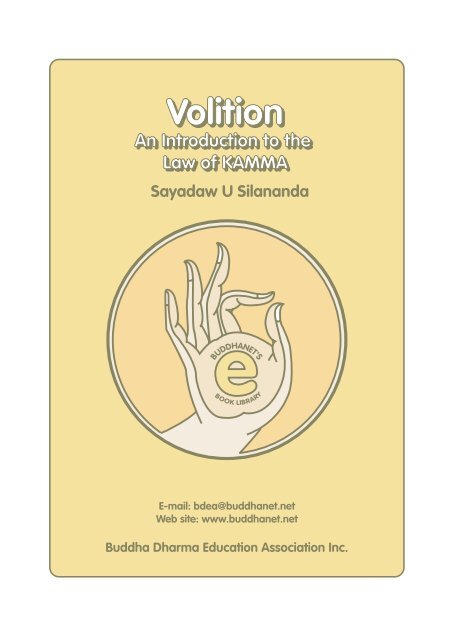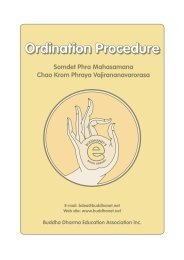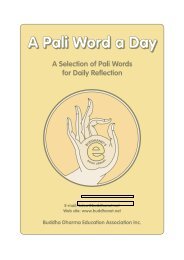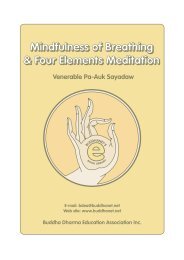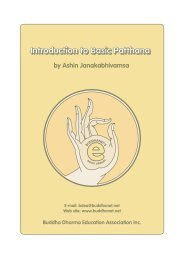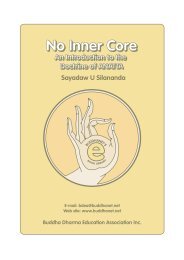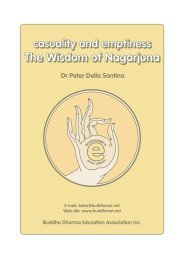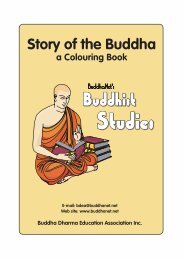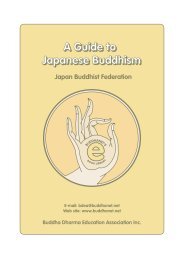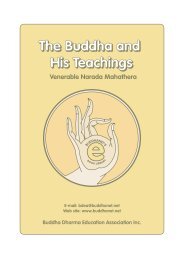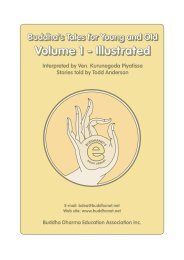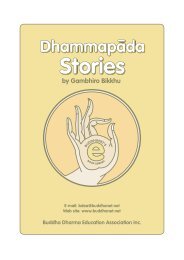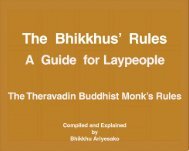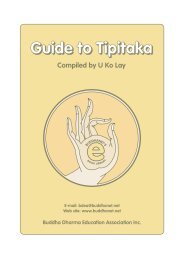Volition: An Introduction of the Law of Kamma - BuddhaNet
Volition: An Introduction of the Law of Kamma - BuddhaNet
Volition: An Introduction of the Law of Kamma - BuddhaNet
Create successful ePaper yourself
Turn your PDF publications into a flip-book with our unique Google optimized e-Paper software.
<strong>Volition</strong><br />
<strong>An</strong> <strong>Introduction</strong> to <strong>the</strong><br />
<strong>Law</strong> <strong>of</strong> KAMMA<br />
Sayadaw U Silananda<br />
e<br />
BUDDHANET'S<br />
BOOK LIBRARY<br />
E-mail: bdea@buddhanet.net<br />
Web site: www.buddhanet.net<br />
Buddha Dharma Education Association Inc.
AN INWARD JOURNEY BOOK<br />
Published by INWARD PATH PUBLISHER<br />
P.O. Box 1034, 10830 Penang, Malaysia.<br />
Tel/Fax: 04 890 6696 • Email: InwardPath@hotmail.com<br />
Special Thanks to Sarah E Marks (Dhammachakka Meditation Center, USA),<br />
on behalf <strong>of</strong> <strong>the</strong> Sayadaw U Silananda for <strong>the</strong> kind permission given to us, <strong>the</strong><br />
Inward Path Publisher, to re-print and publish this booklet in Malaysia. Sayalay<br />
Dhammadinna (Buddhist Hermitage Lunas); Bodhisara Stephen Gerber, Pauline<br />
Chong, Sabrina Ooi, Bro. Fong (Mahindarama), Mr. Ong (Printer) & Mr. Tan<br />
Cheng Hooi, Oh Teik Bin (Persatuan Buddhist Hilir Perak), Mdm. Cheah Siew<br />
Chin, Chai Luan, C.H. Tan (Zen Buddhist Culture Services Centre, Singapore),<br />
and Mdm. Cheah Siew Imn & <strong>An</strong>gie Ng Mei Chen for <strong>the</strong>ir support and assistance,<br />
and for making this Dhamma Book available for Free Distribution.<br />
© 1999 Sayadaw U Silananda, USA.<br />
All Rights Reserved. No part <strong>of</strong> this book may be reproduced in any manner<br />
without written permission from <strong>the</strong> publisher. For additional information please<br />
contact <strong>the</strong> publisher.<br />
Perpustakaan Negara Malaysia – Cataloguing-in-Publication Data:<br />
Silananda, Sayadaw U<br />
<strong>Volition</strong>: an introduction to <strong>the</strong> law <strong>of</strong> <strong>Kamma</strong> /<br />
Sayadaw U Silananda; edited by <strong>An</strong>thony Billings & Maung Tin-Wa;<br />
transcription by Pat McMahan<br />
ISBN 983-9439-20-0<br />
1. Will I. Billings, <strong>An</strong>thony.<br />
II. Tin-Wa, Maung. III. McMahan, Pat.<br />
IV. Title 153.8<br />
First Edition: 1990 The Dhammacakkha Meditation Center, USA.<br />
This Second Edition: 3,000 copies 1999.<br />
Book Layout and Design by Sunanda Lim Hock Eng.<br />
Printed in Penang, Malaysia.<br />
ii
~ VOLITION ~<br />
<strong>An</strong> <strong>Introduction</strong> to <strong>the</strong> <strong>Law</strong> <strong>of</strong> <strong>Kamma</strong><br />
by Sayadaw U Sãlànanda<br />
edited by <strong>An</strong>thony Billings & Maung Tin-Wa<br />
transcription by Pat McMahan<br />
published by INWARD PATH PUBLISHER<br />
Penang • Malaysia<br />
AN INWARD JOURNEY BOOK IJ015/98<br />
iii<br />
cover design by Sunanda H.E. Lim (IPP)
Contents<br />
Preface ................................................................................. 3<br />
The <strong>Law</strong> <strong>of</strong> <strong>Kamma</strong> .................................................. 6<br />
Questions and <strong>An</strong>swers ....................................... 22<br />
Understanding <strong>of</strong> <strong>the</strong> <strong>Law</strong> <strong>of</strong> <strong>Kamma</strong> ...... 26<br />
Classification <strong>of</strong> <strong>Kamma</strong> ..................................... 32<br />
O<strong>the</strong>r Books by Sayadaw U Sãlànanda ..... 38<br />
O<strong>the</strong>r Inward Journey Publications ............ 40<br />
]<br />
2
Preface<br />
W HAT IS kamma? Buddha said: “Oh monks, it is<br />
volition that I call kamma.”<br />
The popular meaning <strong>of</strong> kamma is action or doing,<br />
but as a technical term, kamma means volition or will.<br />
When you do something, <strong>the</strong>re is volition behind it,<br />
and that volition, that mental effort, is called kamma.<br />
Buddha explained that, having willed, one <strong>the</strong>n acts<br />
through body, speech, and mind. Whatever you do,<br />
<strong>the</strong>re is some kind <strong>of</strong> kamma, mental effort, will, and<br />
volition. <strong>Volition</strong> is one <strong>of</strong> <strong>the</strong> fifty-two mental states<br />
which arise toge<strong>the</strong>r with consciousness.<br />
If you are unfamiliar with <strong>the</strong> term kamma, <strong>the</strong>n<br />
this booklet, <strong>Volition</strong>, <strong>An</strong> <strong>Introduction</strong> to <strong>the</strong> <strong>Law</strong> <strong>of</strong><br />
<strong>Kamma</strong> – a Dhamma talk given by a well-known<br />
Burmese Buddhist monk, Sayadaw U Sãlànanda to students<br />
<strong>of</strong> Vipassana meditation and Abhidhamma from<br />
1984 to 1988, in America – might be for you.<br />
Sayadaw U Sãlànanda is <strong>the</strong> Abbot <strong>of</strong> <strong>the</strong> Dhammananda<br />
Vihara, Half Moon Bay, California, and <strong>the</strong><br />
Spiritual Director <strong>of</strong> Dhammachakka Meditation<br />
Center, Theravada Buddhist Society <strong>of</strong> America and<br />
Tathagata Meditation Center, having been chosen by<br />
<strong>the</strong> renowned Burmese meditation master, <strong>the</strong> Most<br />
Venerable Mahasi Sayadaw, to teach in America and<br />
spread <strong>the</strong> Dhamma in <strong>the</strong> West.<br />
Sayadaw has been a Buddhist monk since 1947. He<br />
holds two Dhammàcariya (Master <strong>of</strong> Dhamma) degrees<br />
and has taught at <strong>the</strong> Atithokdayone Pàëi University and<br />
3
was an External Examiner at <strong>the</strong> Department <strong>of</strong> Oriental<br />
Studies, University <strong>of</strong> Art and Sciences, Mandalay,<br />
Myanmar. Sayadaw was <strong>the</strong> chief compiler <strong>of</strong> <strong>the</strong> comprehensive<br />
Tipiñaka Pàëi-Burmese Dictionary and one <strong>of</strong><br />
<strong>the</strong> final editors <strong>of</strong> <strong>the</strong> Pàëi Texts, Commentaries, and<br />
Sub-Commentaries at <strong>the</strong> Sixth Buddhist Council, held<br />
in 1954.<br />
Sayadaw is <strong>the</strong> author <strong>of</strong> seven scholarly Buddhist<br />
books in <strong>the</strong> Burmese language and an English publication<br />
on <strong>the</strong> Four Foundations <strong>of</strong> Mindfulness, in 1990.<br />
Since his arrival in America in 1979, Sayadaw has<br />
been teaching Vipassanà (Insight) meditation, Abhidhamma<br />
(Buddhist psychology), and o<strong>the</strong>r aspects <strong>of</strong><br />
Theravàda Buddhism, and leading meditation retreats<br />
throughout <strong>the</strong> country and in Japan, Europe and Asia.<br />
Sayadaw is actively engaged in teaching a broad range<br />
<strong>of</strong> students in English, Burmese, Pàëi and Sanskrit.<br />
Sayadaw is loved by his students as a skilled, patient<br />
and compassionate teacher.<br />
]<br />
4
Sayadaw U Sãlànanda<br />
I see me smiling in your eyes<br />
But, you see me smiling in your heart<br />
A quiet pond reflects <strong>the</strong> great forest <strong>of</strong> life<br />
Deeds touch its heart that cannot disregard<br />
5<br />
– Sabrina Ooi
The <strong>Law</strong> <strong>of</strong> <strong>Kamma</strong><br />
T he subject <strong>of</strong> this lecture is <strong>the</strong> law <strong>of</strong> kamma. Many<br />
people who are not born as Buddhists are attracted<br />
to Buddhism by <strong>the</strong> doctrine <strong>of</strong> kamma because it explains<br />
such phenomena as <strong>the</strong> individual differences<br />
among human beings and also why good people suffer<br />
in this life.<br />
I know <strong>of</strong> an Italian man. He pondered a great<br />
deal about <strong>the</strong> inequalities and individual differences<br />
among human beings. He was thinking about <strong>the</strong>se<br />
things, asked many people about <strong>the</strong>m, but did not get<br />
a satisfactory answer. One day, he took hold <strong>of</strong> a book<br />
on Buddhism and read about <strong>the</strong> law <strong>of</strong> kamma. When<br />
he read about <strong>the</strong> law <strong>of</strong> kamma, he was very satisfied<br />
with <strong>the</strong> explanations given according to that law. He<br />
decided to study more about Buddhism and <strong>the</strong>n went<br />
to <strong>the</strong> East to receive ordination. He became a Buddhist<br />
monk and died at <strong>the</strong> age <strong>of</strong> eighty as a Buddhist monk.<br />
He was initially attracted to Buddhism by <strong>the</strong> doctrine<br />
<strong>of</strong> kamma.<br />
<strong>Kamma</strong> is not moral justice. If one takes it as<br />
moral justice, <strong>the</strong>n one suggests that someone is sitting<br />
in judgement over beings. There is no one who<br />
makes judgements over <strong>the</strong> doings <strong>of</strong> beings; <strong>the</strong>re<br />
is just <strong>the</strong> moral law <strong>of</strong> kamma. Just as kamma is not<br />
moral judgement, so it is not reward and punishment.<br />
According to <strong>the</strong> law <strong>of</strong> kamma, if you do good deeds,<br />
you get good results, and if you do bad deeds, you get<br />
bad results. However, <strong>the</strong>se good and bad results are<br />
6
not given by anyone and are not given as reward and<br />
punishment. <strong>Kamma</strong> is a moral law which needs no<br />
lawgiver, a law which operates naturally.<br />
The inequalities among human beings – <strong>the</strong> individual<br />
differences between people – has troubled<br />
many thinkers in <strong>the</strong> past as well as in <strong>the</strong> present.<br />
During <strong>the</strong> time <strong>of</strong> <strong>the</strong> Buddha, <strong>the</strong>re lived a brahman<br />
named Todeyya. He was a very rich man, a millionaire.<br />
But he did not believe in generosity, in giving.<br />
He said, “If you give, <strong>the</strong>n you become poor; so don’t<br />
give anything away.” He was so stingy that he became<br />
a millionaire, and he died a millionaire. But he was so<br />
attached to his riches that, after death, he was reborn<br />
as a dog in his own house.<br />
One day, <strong>the</strong> Buddha went to that house, and <strong>the</strong><br />
dog saw him and barked at him. The Budhha replied:<br />
“Oh, Todeyya! You showed disrespect when you were a<br />
human being, and nowyou show disrespect by barking<br />
at me. You will be reborn in hell.” When <strong>the</strong> Buddha<br />
said that, <strong>the</strong> dog thought, “Oh, recluse Gautama<br />
knows me,” and he was so distressed that he went to a<br />
heap <strong>of</strong> ashes and lay down on <strong>the</strong>m.<br />
The brahman had a son named Subha, and <strong>the</strong><br />
dog, his fa<strong>the</strong>r, was his favorite. He had a special place<br />
for <strong>the</strong> dog, but when he saw that <strong>the</strong> dog had gone<br />
to <strong>the</strong> heap <strong>of</strong> ashes, Subha was alarmed. He was told<br />
that Gautama had said something to <strong>the</strong> dog which<br />
depressed <strong>the</strong> animal. So he went to <strong>the</strong> Buddha<br />
and asked him about it. The Buddha told him what<br />
happened.<br />
7
Subha said to himself: “According to <strong>the</strong> teachings<br />
<strong>of</strong> <strong>the</strong> brahmans, my fa<strong>the</strong>r should have been reborn<br />
as a Brahma. But Gautama has told me that he was<br />
reborn as a dog. Gautama speaks heedlessly.” He went<br />
back to <strong>the</strong> Buddha to argue with him. The Buddha<br />
asked him whe<strong>the</strong>r or not <strong>the</strong>re were some riches not<br />
disclosed by his fa<strong>the</strong>r, and Subha replied that, indeed,<br />
a great deal <strong>of</strong> money was missing and had not been<br />
disclosed by his fa<strong>the</strong>r. Buddha told him to feed <strong>the</strong><br />
dog late at night near bedtime and <strong>the</strong>n ask <strong>the</strong> dog<br />
where <strong>the</strong> riches were.<br />
Subha thought that if what <strong>the</strong> Buddha said were<br />
true, he could recover <strong>the</strong> riches, and if what he said<br />
were false, he could accuse <strong>the</strong> Buddha <strong>of</strong> falsehood.<br />
Subha fed <strong>the</strong> dog at bedtime and asked him about<br />
<strong>the</strong> undisclosed riches. The dog got up and took him<br />
to <strong>the</strong> place where <strong>the</strong> riches were hidden. Subha dug<br />
up <strong>the</strong> treasure and recovered it.<br />
Subha <strong>the</strong>n went to <strong>the</strong> Buddha and asked him<br />
why people are different from each o<strong>the</strong>r, why some<br />
have long lives, while o<strong>the</strong>rs have short lives. He also<br />
asked why some people are sickly and prone to disease,<br />
while o<strong>the</strong>rs are healthy; why some are ugly,<br />
while o<strong>the</strong>rs are beautiful; why some have few friends,<br />
while o<strong>the</strong>rs have many; why some are rich, while o<strong>the</strong>rs<br />
are poor; why some are born in favourable circumstances,<br />
while o<strong>the</strong>rs are not; and why some are born<br />
with much intelligence, while o<strong>the</strong>rs are dull-witted.<br />
The Buddha answered his questions: “Oh, young<br />
man! Beings are owners <strong>of</strong> <strong>the</strong>ir deed, heirs <strong>of</strong> <strong>the</strong>ir<br />
deeds, have deeds as <strong>the</strong>ir parents, <strong>the</strong>ir kin, <strong>the</strong>ir ref-<br />
8
uge. Deeds divide beings in lowness and excellence.”<br />
Buddha gave this very short answer, but Subha did<br />
not understand. So Buddha elaborated upon <strong>the</strong> law <strong>of</strong><br />
kamma.<br />
Some beings like to kill o<strong>the</strong>r beings and get in <strong>the</strong><br />
habit <strong>of</strong> killing. After death, <strong>the</strong>se people are reborn in<br />
four lower, woeful states – animal world, ghost world,<br />
demon world, and hell. But if <strong>the</strong>y are reborn as human<br />
beings, <strong>the</strong>ir lives are short. Those who do not kill<br />
beings, who have compassion for <strong>the</strong>m, may be reborn<br />
in <strong>the</strong> deva (celestial being) world. If <strong>the</strong>y are reborn as<br />
human beings, <strong>the</strong>y have long lives.<br />
The Buddha <strong>the</strong>n explained about sickness and<br />
health. Some people cause injury to o<strong>the</strong>r beings; <strong>the</strong>y<br />
like to inflict injury on o<strong>the</strong>rs. On account <strong>of</strong> that, <strong>the</strong>y<br />
are reborn in four woeful states. But if <strong>the</strong>y are reborn<br />
as human beings, <strong>the</strong>y are sickly and prone to disease.<br />
Those who do not cause injury to o<strong>the</strong>rs are reborn as<br />
devas, or if <strong>the</strong>y are reborn as human beings, <strong>the</strong>y are<br />
endowed with good health.<br />
Why are some people ugly, while o<strong>the</strong>rs are beautiful?<br />
The Buddha explained that some people become<br />
angry very easily, and owing to this anger, <strong>the</strong>y are<br />
reborn in four woeful states. But if <strong>the</strong>y are reborn as<br />
human beings, <strong>the</strong>y are ugly. (<strong>An</strong>ger makes you look<br />
ugly, so when you are angry, look at yourself in <strong>the</strong><br />
mirror and see how beautiful or ugly you are.) But<br />
some people have no anger, do not become angry<br />
easily, and have thoughts <strong>of</strong> loving kindness, or mettà,<br />
towards people. These people are reborn as devas, or if<br />
<strong>the</strong>y are reborn as human beings, <strong>the</strong>y are beautiful.<br />
9
So if you want to be beautiful, at least in <strong>the</strong> next life,<br />
check your anger – don’t get angry!<br />
Why do some people have no friends, while o<strong>the</strong>rs<br />
have many? Some people are jealous, and on account <strong>of</strong><br />
that jealousy, <strong>the</strong>y are reborn in <strong>the</strong> four woeful states.<br />
But if <strong>the</strong>y are reborn as human beings, <strong>the</strong>y have few<br />
or no friends. Those who are not jealous are reborn as<br />
devas, or if <strong>the</strong>y are reborn as human beings, <strong>the</strong>y have<br />
many good friends. We can say, according to <strong>the</strong> law <strong>of</strong><br />
kamma, that those who cannot have friends were jealous<br />
in a past life.<br />
Why are some people rich, while o<strong>the</strong>rs are poor?<br />
Some people are stingy; <strong>the</strong>y do not want to give anything.<br />
By being stingy, by not being generous, <strong>the</strong>y may<br />
be reborn in four woeful states. But if <strong>the</strong>y are reborn<br />
as human beings, <strong>the</strong>y are poor. Those who are giving<br />
and generous become rich people. So if you want to<br />
become rich, give!<br />
The Buddha also explained why some people are<br />
born into good circumstances, while o<strong>the</strong>rs are born<br />
into unfortunate circumstances. Some people are very<br />
proud, look down on o<strong>the</strong>r people, and have little respect<br />
for o<strong>the</strong>rs. On account <strong>of</strong> this false pride, such<br />
people are reborn in four woeful states, but if <strong>the</strong>y are<br />
reborn as human beings, <strong>the</strong>y are born into unfortunate<br />
circumstances. Those who have no false pride,<br />
who have humility, are reborn as devas, unless <strong>the</strong>y are<br />
reborn as human beings, in which case <strong>the</strong>y are born<br />
in favorable circumstances.<br />
Why are some people dull-witted, while o<strong>the</strong>rs are<br />
intelligent? Buddha explained that some people have<br />
10
no desire for knowledge, no desire to ask questions,<br />
no desire to know about <strong>the</strong> nature <strong>of</strong> things. With no<br />
knowledge <strong>of</strong> right conduct, <strong>the</strong>se unknowing people<br />
perform wrong actions and thus may be reborn in four<br />
woeful states. If <strong>the</strong>y are reborn as human beings, <strong>the</strong>y<br />
are dull-witted. Those who desire knowledge, who<br />
ask questions about <strong>the</strong> nature <strong>of</strong> things, are reborn<br />
in <strong>the</strong> deva world. But if <strong>the</strong>y are reborn as human<br />
beings, <strong>the</strong>y are intelligent. So if you want to be intelligent<br />
in <strong>the</strong> next life, don’t hesitate to ask questions. I<br />
don’t need to tell you to ask questions, especially you<br />
American people. You ask many questions, and it is a<br />
good thing.<br />
The Buddha gave <strong>the</strong>se answers to Subha’s questions.<br />
From <strong>the</strong> law <strong>of</strong> kamma, we can infer about a<br />
person’s past lives. Buddha said that beings are owners<br />
<strong>of</strong> <strong>the</strong>ir deeds, owners <strong>of</strong> <strong>the</strong>ir kamma. <strong>Kamma</strong> alone<br />
is <strong>the</strong>ir property; nothing else is. <strong>Kamma</strong> is a very important<br />
subject in Buddhism.<br />
]<br />
What is kamma? Buddha said: “Oh monks, it is volition<br />
that I call kamma.” The popular meaning <strong>of</strong> kamma<br />
is action or doing, but as a technical term, kamma<br />
means volition or will. When you do something, <strong>the</strong>re<br />
is volition behind it, and that volition, that mental<br />
effort, is called kamma. Buddha explained that, having<br />
willed, one <strong>the</strong>n acts through body, speech and mind.<br />
Whatever you do, <strong>the</strong>re is some kind <strong>of</strong> kamma, mental<br />
11
effort, will and volition. <strong>Volition</strong> is one <strong>of</strong> <strong>the</strong> fifty-two<br />
mental states which arise toge<strong>the</strong>r with consciousness.<br />
When you do something, such as make an <strong>of</strong>fering<br />
to <strong>the</strong> Buddha, <strong>the</strong>re is volition which prompts you to<br />
give, and that volition is called kamma. Thus, kamma<br />
is <strong>the</strong> cause, not <strong>the</strong> effect. Some people say that kamma<br />
means <strong>the</strong> cause, <strong>the</strong> deeds, and also <strong>the</strong> effects.<br />
But in Theravàda Buddhism, kamma never means <strong>the</strong><br />
effect or <strong>the</strong> result. <strong>Kamma</strong> means only <strong>the</strong> cause.<br />
<strong>Kamma</strong> belongs to <strong>the</strong> mental aggregates. There are<br />
five aggregates: materiality, feeling, perception, mental<br />
formations, and consciousness. <strong>Volition</strong> belongs to <strong>the</strong><br />
aggregate <strong>of</strong> formations. The aggregate <strong>of</strong> formations<br />
is mental, and just as o<strong>the</strong>r mental states, it lasts only<br />
a very short moment. It comes into being, stays only<br />
a little bit <strong>of</strong> time, and <strong>the</strong>n passes away. But volition<br />
is different from o<strong>the</strong>r mental states in that it has <strong>the</strong><br />
ability to leave some potential. When it dies, it does not<br />
disappear altoge<strong>the</strong>r. It leaves something, some power<br />
or potential to give results, when circumstances favor<br />
those results to appear. One does kamma here and<br />
now, but <strong>the</strong> results may be in this life, <strong>the</strong> next life, or<br />
in some life after <strong>the</strong> next life.<br />
<strong>Kamma</strong> or volition has potential to give results,<br />
and this potential is a tremendous force. <strong>Kamma</strong> does<br />
not end with <strong>the</strong> demise <strong>of</strong> <strong>the</strong> present life; it goes<br />
on and on. But we cannot say that kamma is stored<br />
somewhere in our body or consciousness because<br />
everything is impermanent and must be continually<br />
changing. <strong>Kamma</strong> is likewise impermanent and so<br />
disappears, but it leaves a potential in <strong>the</strong> continuity<br />
12
<strong>of</strong> beings so that, when circumstances are favorable for<br />
results to appear, those results appear.<br />
Once again, kamma is not stored anywhere, but<br />
when it disappears, it leaves a potential for results.<br />
Similarly, a tree can be said to have <strong>the</strong> potential to<br />
give fruits. There are no fruits in <strong>the</strong> trees at first, but<br />
when <strong>the</strong> opportune times arises, fruits appear.<br />
<strong>An</strong>o<strong>the</strong>r illustration we can use is that <strong>of</strong> <strong>the</strong> old<br />
Buddhist simile <strong>of</strong> <strong>the</strong> sun, cow dung, and gem (gem is<br />
like a magnifying glass). When <strong>the</strong>re is sun, and when<br />
you put a magnifying glass on <strong>the</strong> dried cow dung, you<br />
get fire. One cannot say that <strong>the</strong> new fire was stored<br />
in <strong>the</strong> cow dung, or in <strong>the</strong> sun, or in <strong>the</strong> magnifying<br />
glass. But when <strong>the</strong>se things come toge<strong>the</strong>r, we have<br />
a fire. The circumstances were favorable for <strong>the</strong> fire to<br />
appear. Likewise, <strong>the</strong> results <strong>of</strong> kamma.<br />
<strong>Kamma</strong> and its results are not <strong>the</strong> same thing. It<br />
is not <strong>the</strong> case that kamma gradually matures into results.<br />
One kind <strong>of</strong> Hindu philosophy teaches that <strong>the</strong><br />
result is already in <strong>the</strong> kamma in unmanifested form,<br />
and <strong>the</strong> kamma matures itself into <strong>the</strong> result. So cause<br />
and effect are essentially <strong>the</strong> same in that philosophy.<br />
But Buddhism does not accept that. Buddhism<br />
teaches that kamma and result are void <strong>of</strong> one ano<strong>the</strong>r,<br />
although no results exist without kamma. The results<br />
depend on kamma entirely, but <strong>the</strong> results do not exist<br />
within kamma, nor does kamma persist within <strong>the</strong><br />
results. <strong>Kamma</strong> and results belong to different times.<br />
The results are born wholly depending on kamma<br />
done in <strong>the</strong> past, and when circumstances combine in<br />
13
a way that is favorable for <strong>the</strong> results to appear (like<br />
sun, dung and gem), results will appear.<br />
The technical name for results <strong>of</strong> kamma is vipàka,<br />
which we call <strong>the</strong> fruit <strong>of</strong> kamma. <strong>Kamma</strong> or volition<br />
from <strong>the</strong> past leaves a potential for <strong>the</strong> fruits or vipàka<br />
to arise in <strong>the</strong> present. But <strong>the</strong> past kamma does not<br />
influence present volition. A person’s reaction to past<br />
results will ei<strong>the</strong>r produce good or bad results for <strong>the</strong><br />
future, depending on <strong>the</strong> nature <strong>of</strong> <strong>the</strong> volition. If <strong>the</strong>y<br />
react with what we call wise attention (yoniso manasikàra),<br />
<strong>the</strong> result or fruit will be good in <strong>the</strong> future. But<br />
if <strong>the</strong>y react with unwise attention (ayoniso manasikàra),<br />
<strong>the</strong> results or fruit <strong>of</strong> such volition will be bad in <strong>the</strong><br />
future. So you cannot do much about <strong>the</strong> fruits <strong>of</strong> past<br />
kamma, but you can react to those fruits with wise attention<br />
and thus have good results in <strong>the</strong> future. Wise<br />
attention will allow you to do good kamma, while unwise<br />
attention will cause you to do bad kamma. The<br />
future results or fruit will depend on your volition<br />
(kamma), in <strong>the</strong> present.<br />
Not everything, however, is due to kamma.<br />
Sometimes we are wont to say that everything is due<br />
to kamma, that “it is your kamma and you have to<br />
bear this and that because <strong>of</strong> it.” Although kamma is a<br />
law governing <strong>the</strong> whole universe, it is only one <strong>of</strong> <strong>the</strong><br />
laws. O<strong>the</strong>r natural and psychic laws also govern <strong>the</strong><br />
life <strong>of</strong> beings.<br />
In addition, we must distinguish between <strong>the</strong><br />
results <strong>of</strong> past kamma and present kamma. Present<br />
kamma is not <strong>the</strong> result <strong>of</strong> past kamma. The result<br />
<strong>of</strong> past kamma is resultant consciousness known as<br />
14
vipàka. The resultant consciousness is <strong>the</strong> result <strong>of</strong> past<br />
kamma, but that resultant consciousness does not influence<br />
<strong>the</strong> performance <strong>of</strong> <strong>the</strong> kusala (wholesome) or<br />
akusala (unwholesome) acts <strong>of</strong> <strong>the</strong> present. Kusala or<br />
akusala kamma is not <strong>the</strong> result <strong>of</strong> past kamma; ra<strong>the</strong>r,<br />
you are accumulating fresh kamma in <strong>the</strong> present life,<br />
and that will give results in <strong>the</strong> future.<br />
]<br />
<strong>Kamma</strong> is classified into different groups and different<br />
kinds. One <strong>of</strong> <strong>the</strong> classifications <strong>of</strong> kamma<br />
is into good kamma and bad kamma. There are ten<br />
good kammas, ten good volitions or deeds. They are<br />
good because <strong>the</strong>y appear with good mental states,<br />
good mental components, and <strong>the</strong>y give good results.<br />
The first good kamma is generosity, or giving. We<br />
have to practice generosity because by giving what<br />
we have to o<strong>the</strong>rs, we acquire kusala, also known as<br />
merit. This kusala kamma will give results in future<br />
lives. Generosity also helps us practice detachment.<br />
For example, I may be attached to this tape recorder. If<br />
I give it away to ano<strong>the</strong>r person, I not only give up <strong>the</strong><br />
machine, but I also give up attachment to it. I get rid<br />
<strong>of</strong> attachment, known as lobha, and when your mind<br />
is free from lobha, it is liberated, clear, and tranquil.<br />
Thus, people are encouraged to practice giving (dàna)<br />
as <strong>of</strong>ten as possible.<br />
The second good kamma is morality. Morality<br />
means taking precepts and keeping <strong>the</strong>m. For lay<br />
15
Buddhists, five precepts are <strong>the</strong> minimum requirement:<br />
not to kill, not to steal, not to indulge in sexual<br />
misconduct, not to lie, and not to take intoxicants. On<br />
retreats, we add three more precepts for a total <strong>of</strong> eight.<br />
The additional three are abstention from eating after<br />
noon, from music and adornments, and from high and<br />
luxurious beds and seats. Morality, known as sãla, is<br />
<strong>the</strong> foundation <strong>of</strong> samàdhi, or meditation.<br />
The third good kamma is meditation, mental culture.<br />
This is <strong>the</strong> best kamma you can do in this life: to<br />
practice vipassanà meditation.<br />
The fourth good kamma is reverence, giving respect<br />
to o<strong>the</strong>rs, especially to older people. In <strong>the</strong> East, it<br />
is taken for granted that younger people give respect<br />
to older people. In this way, <strong>the</strong> relationship between<br />
parents and children, and teachers and students, are<br />
governed by rules <strong>of</strong> reverence.<br />
The fifth good kamma is service, to do something<br />
good for someone, such as helping a lady cross <strong>the</strong><br />
street or helping her carry some heavy things. <strong>An</strong>o<strong>the</strong>r<br />
type <strong>of</strong> service is giving service to <strong>the</strong> Buddha, to <strong>the</strong><br />
Dhamma, and to <strong>the</strong> Sangha. When you are cleaning<br />
or renovating <strong>the</strong> monastery, that is very good service.<br />
The sixth good kamma is <strong>the</strong> sharing <strong>of</strong> merit.<br />
When you have acquired some merit, you must share<br />
this merit with o<strong>the</strong>r beings. Sharing <strong>of</strong> merit is itself<br />
merit, and we share merit with all beings. Sharing<br />
<strong>of</strong> merit does not mean that we give a portion <strong>of</strong> our<br />
merit to o<strong>the</strong>r beings. It means that we let <strong>the</strong>m get a<br />
chance to acquire merit <strong>the</strong>mselves. Once a man asked<br />
Pacceka Buddha whe<strong>the</strong>r <strong>the</strong> merit decreases if a per-<br />
16
son shares it with o<strong>the</strong>r people. The Pacceka Buddha<br />
told him: “If you have a candle, and if you light ano<strong>the</strong>r<br />
candle from <strong>the</strong> lighted one, <strong>the</strong> light <strong>of</strong> <strong>the</strong> first<br />
candle does not decrease when it lights <strong>the</strong> o<strong>the</strong>r one.<br />
Actually it becomes brighter with <strong>the</strong> help <strong>of</strong> <strong>the</strong> newly<br />
lit candle. In <strong>the</strong> same way, when you share merit, your<br />
merit does not decrease but actually increases because<br />
you get new merit.”<br />
The seventh good kamma is rejoicing at ano<strong>the</strong>r’s<br />
merit. This means saying, “Sàdhu, sàdhu, sàdhu,” which<br />
means “well done” when o<strong>the</strong>rs do meritorious deeds.<br />
When o<strong>the</strong>r people share merit with you, you say,<br />
“Sàdhu, sàdhu, sàdhu.” This means that you rejoice at<br />
<strong>the</strong>ir merit, and by rejoicing at <strong>the</strong>ir merit, you get<br />
merit yourself.<br />
The eighth good kamma is listening to <strong>the</strong><br />
Dhamma. This is good merit, a good deed. By listening<br />
to <strong>the</strong> Dhamma, you will come to know <strong>the</strong> Dhamma,<br />
and when you come to know <strong>the</strong> Dhamma, you can<br />
avoid doing unwholesome acts and do wholesome acts<br />
instead.<br />
<strong>An</strong>d related to <strong>the</strong> eighth good kamma is <strong>the</strong> ninth,<br />
speaking on <strong>the</strong> Dhamma, giving talks on <strong>the</strong> Dhamma.<br />
So we are both doing good kamma right now.<br />
The tenth and last good kamma is called <strong>the</strong><br />
straightening <strong>of</strong> one’s view. This means that one has<br />
<strong>the</strong> knowledge that kamma is entirely one’s own property,<br />
that we alone are <strong>the</strong> owner <strong>of</strong> our deeds, and that<br />
no one else is responsible for our actions, our kamma.<br />
17
Thus we have <strong>the</strong>se ten good kammas. Actually,<br />
<strong>the</strong>y can be categorized into three: generosity, morality,<br />
and meditation.<br />
1. Paying respect and service are included in<br />
morality (sãla);<br />
2. Sharing <strong>of</strong> merit and rejoicing at ano<strong>the</strong>r’s<br />
merit are included in generosity (dàna); and<br />
3. Listening to <strong>the</strong> Dhamma, talking on <strong>the</strong><br />
Dhamma, and straightening <strong>of</strong> one’s views<br />
can be classified under meditation, or mental<br />
culture (bhàvanà).<br />
Let us now look at <strong>the</strong> bad kammas. Bad kammas are<br />
those deeds which give bad results, deeds which go<br />
with unwholesome mental states.<br />
The first <strong>of</strong> <strong>the</strong>se bad kammas is killing, <strong>the</strong> killing<br />
<strong>of</strong> beings.<br />
The second is stealing, taking what is not given.<br />
The third is sexual misconduct.<br />
Fourth is telling lies.<br />
Fifth is slandering, backbiting.<br />
Sixth is harsh language, harsh speech, words <strong>of</strong><br />
abuse – all bad kamma.<br />
Seventh is frivolous talk, fruitless talk which has<br />
no value or meaning.<br />
Number eight is covetousness, which is wanting<br />
to possess ano<strong>the</strong>r person’s property. In Pàëi, we<br />
call this Visama lobha, which means distorted greed.<br />
This is not <strong>the</strong> greed you have for your own property.<br />
18
Covetousness here means that you want to possess ano<strong>the</strong>r<br />
person’s property, and this is a very bad form <strong>of</strong><br />
greed.<br />
The ninth form <strong>of</strong> bad kamma is ill will, or dosa.<br />
That is wanting to hurt people, wanting to cause injury<br />
to o<strong>the</strong>rs.<br />
Finally, we come to <strong>the</strong> tenth bad kamma, which<br />
is wrong view. Wrong view is having <strong>the</strong> belief that<br />
things are permanent, satisfactory, and one is in possession<br />
<strong>of</strong> a soul or self.<br />
These are <strong>the</strong> ten bad kammas which give bad<br />
results and which we must avoid if we do not want<br />
those results. Refraining from <strong>the</strong>se kammas is said to<br />
be good kamma; refraining from killing, stealing, and<br />
all <strong>the</strong> o<strong>the</strong>r bad kammas is actually good kamma. We<br />
must have knowledge <strong>of</strong> <strong>the</strong> law <strong>of</strong> kamma, <strong>the</strong> knowledge<br />
that kamma is entirely one’s responsibility. This<br />
is very important in Buddhism and is part <strong>of</strong> <strong>the</strong> good<br />
kamma we call <strong>the</strong> straightening <strong>of</strong> view.<br />
Knowledge <strong>of</strong> kamma is conducive to tranquility,<br />
which is one <strong>of</strong> <strong>the</strong> seven factors <strong>of</strong> enlightenment. In<br />
order to experience tranquility, one has to do many<br />
things, and reflecting upon kamma as one’s own is<br />
one <strong>of</strong> <strong>the</strong>m. Sometimes you are agitated and restless<br />
because you do not have what you want, or you have<br />
what you do not want. In such a situation, reflecting<br />
upon kamma will help you to be rid <strong>of</strong> restlessness<br />
and <strong>the</strong>reby gain tranquility because you cannot do<br />
anything to change kamma from <strong>the</strong> past. You have to<br />
put up with what you deserve as <strong>the</strong> result <strong>of</strong> past volition,<br />
past kamma.<br />
19
Reflecting upon kamma is a good way <strong>of</strong> getting<br />
rid <strong>of</strong> resentment. Sometimes when you practice lovingkindness<br />
meditation, you ironically begin to feel resentment<br />
because you are being asked to send thoughts <strong>of</strong><br />
loving kindness to someone who is, perhaps, hateful to<br />
you. One way to get rid <strong>of</strong> <strong>the</strong> resentment is to reflect<br />
upon kamma as your own. You reflect:<br />
“I am reborn here as <strong>the</strong> result <strong>of</strong> my own<br />
kamma, and <strong>the</strong> o<strong>the</strong>r person is reborn here<br />
for <strong>the</strong> same reason, and <strong>the</strong>re is nothing I can<br />
do about it. But by being resentful towards <strong>the</strong><br />
person, I am accomplishing new akusala kamma,<br />
which will give me bad results in <strong>the</strong> four woeful<br />
states.”<br />
By so reflecting upon kamma, one can get rid <strong>of</strong><br />
resentment.<br />
Knowledge <strong>of</strong> kamma also promotes self-reliance.<br />
Since kamma is your own, you are <strong>the</strong> architect <strong>of</strong><br />
your life. You must rely on yourself, not on o<strong>the</strong>rs, to<br />
get good results; you must do good kamma yourself.<br />
Since beings get results according to <strong>the</strong>ir kamma, no<br />
one can help ano<strong>the</strong>r in getting those results. In addition<br />
to teaching self-reliance, knowledge <strong>of</strong> kamma<br />
teaches a sense <strong>of</strong> individual responsibility. We are<br />
responsible for ourselves, and whatever we have or<br />
have made in this life, we alone are responsible for it.<br />
When we meet with good circumstances, it is a result<br />
<strong>of</strong> what we have done in <strong>the</strong> past. In <strong>the</strong> same way,<br />
when we find ourselves in unfavorable circumstances,<br />
we are responsible.<br />
20
So if you want to get good results, <strong>the</strong>n you need<br />
only do good kamma in this life. In this way, knowledge<br />
<strong>of</strong> kamma gives consolation and hope because<br />
we can rely on ourselves to shape our future lives by<br />
doing good kamma here. Thus kamma is not fate or<br />
destiny, for we can avoid <strong>the</strong> results <strong>of</strong> bad kamma<br />
by doing good kamma in this life. We do not have<br />
to be afraid <strong>of</strong> anyone who sits in judgement over us<br />
or <strong>of</strong> anyone who can send us to hell. According to<br />
Buddhism, no one can send us to hell but ourselves,<br />
but we can also send ourselves to <strong>the</strong> deva world.<br />
Knowledge <strong>of</strong> and belief in <strong>the</strong> law <strong>of</strong> kamma<br />
is a basic requirement for a Buddhist. Tanungpulu<br />
Sayadaw has stressed this point. With this belief and<br />
knowledge, one does meritorious deeds, and <strong>the</strong>se<br />
meritorious deeds are <strong>the</strong> best meritorious deeds if<br />
<strong>the</strong>y are done with knowledge <strong>of</strong> kamma and its results<br />
in mind. If you invoke <strong>the</strong> knowledge <strong>of</strong> kamma<br />
when you do meritorious deeds, <strong>the</strong>n your deeds are<br />
said to have three wholesome roots, which are nonattachment,<br />
non-anger, and non-delusion. When your<br />
meritorious deeds are accompanied by three wholesome<br />
roots, <strong>the</strong>y will give results in future lives, and<br />
you will be reborn as a person endowed with those<br />
roots. Those born with <strong>the</strong> three wholesome roots are<br />
able to attain jhàna or Nibbàna in <strong>the</strong>ir present life. Thus<br />
it is very important to have knowledge <strong>of</strong> kamma in us<br />
at <strong>the</strong> time <strong>of</strong> doing meritorious deeds.<br />
]<br />
21
Questions and <strong>An</strong>swers<br />
Q: Is <strong>the</strong> intention <strong>of</strong> sharing merit to inspire o<strong>the</strong>rs to gain<br />
merit for <strong>the</strong>mselves?<br />
A: Yes. When you are glad at <strong>the</strong> meritorious deeds<br />
<strong>of</strong> o<strong>the</strong>r people, that gladness itself is a meritorious<br />
deed. This sharing <strong>of</strong> meritorious deeds is<br />
most effective for persons who have departed. For<br />
example, a person dies and is reborn as a hungry<br />
ghost, a peta. If o<strong>the</strong>r people, relatives, do meritorious<br />
deeds and share <strong>the</strong>m with <strong>the</strong> ghost (by<br />
saying: ”let <strong>the</strong> ghost come here and rejoice at our<br />
meritorious deeds”), <strong>the</strong>n <strong>the</strong> ghost, by hearing<br />
that and rejoicing at those deeds, can get good<br />
results immediately. The peta gets results immediately,<br />
but we in this life do not get results so soon.<br />
There is a story <strong>of</strong> <strong>the</strong> relatives <strong>of</strong> <strong>the</strong> King Bimbisara<br />
<strong>of</strong> India who became a disciple <strong>of</strong> Buddha and<br />
attained <strong>the</strong> first stage <strong>of</strong> sainthood. In his past<br />
life, he had many relatives who did an evil deed.<br />
Some people were preparing to <strong>of</strong>fer some food<br />
to <strong>the</strong> sangha headed by Buddha, and Bimbisara’s<br />
relatives helped <strong>the</strong>mselves dishonestly to some<br />
<strong>of</strong> it. On account <strong>of</strong> that, <strong>the</strong>y were reborn as<br />
hungry ghosts who could not get enough shelter<br />
and nourishment. Bimbisara <strong>of</strong>fered food to <strong>the</strong><br />
Buddha, and <strong>the</strong> hungry ghost expected Bimbisara<br />
to share merit with <strong>the</strong>m. But Bimbisara did not<br />
know about sharing merit, and <strong>the</strong> ghost got noth-<br />
22
ing. This angered <strong>the</strong>m, and <strong>the</strong>y showed fearful<br />
appearances to <strong>the</strong> king during <strong>the</strong> night. He told<br />
<strong>the</strong> Buddha about this <strong>the</strong> next morning, and <strong>the</strong><br />
Buddha advised Bimbisara to share merit with his<br />
relatives when doing meritorious deeds. Bimbisara<br />
followed <strong>the</strong> advice and specifically dedicated his<br />
share <strong>of</strong> merit to <strong>the</strong>m. They said, “Sàdhu, sàdhu,<br />
sàdhu,” and <strong>the</strong>y got good results immediately.<br />
Q: Can we escape <strong>the</strong> results <strong>of</strong> bad kamma?<br />
A: There are different kammas. Some give results in<br />
<strong>the</strong> next life; some in lives after that. The ones that<br />
gives results in future lives are a store <strong>of</strong> kamma,<br />
which everyone has. We have gone through this<br />
saÿsàra (rounds <strong>of</strong> rebirth) for many aeons, and<br />
we have done good things and bad things. Some<br />
<strong>of</strong> <strong>the</strong> kammas may have given results, but some<br />
may have not yet given results. Both good and bad<br />
kammas are, in a way, waiting for a chance to give<br />
results. Bad kammas give results when <strong>the</strong>y favorable<br />
opportunities, favorable circumstances to give<br />
results. If you do bad kamma here, <strong>the</strong>n bad kamma<br />
from <strong>the</strong> past is more likely to give results by<br />
your doing new bad kamma. But if you do good<br />
kamma here and now, you can block, but not eradicate<br />
totally, <strong>the</strong> bad kamma from <strong>the</strong> past. That is<br />
why people are asked to do meritorious deeds.<br />
Buddha once put this in <strong>the</strong> form <strong>of</strong> a simile. If<br />
you put a spoonful <strong>of</strong> salt in a cup <strong>of</strong> water, that<br />
water becomes very salty. But if you put <strong>the</strong> same<br />
23
amount <strong>of</strong> salt in a lake, that water will not be very<br />
salty. In this way, when you have a large amount<br />
<strong>of</strong> good kamma, you can counteract or dilute <strong>the</strong><br />
effects <strong>of</strong> bad kamma.<br />
Only when you attain arahantship (Arahant – one<br />
who has attained <strong>the</strong> highest level <strong>of</strong> spiritual<br />
development, who is free and will not be reborn<br />
again) can you completely eradicate <strong>the</strong> effects <strong>of</strong><br />
kamma altoge<strong>the</strong>r. But we can block <strong>the</strong> effects <strong>of</strong><br />
bad kamma here, by doing good deeds. By doing<br />
good deeds, we make circumstances unfavorable<br />
for <strong>the</strong> bad kamma from <strong>the</strong> past to give results.<br />
Q: Are results and actions actually separate stages <strong>of</strong><br />
consciousness?<br />
A: They are separate mental states according to <strong>the</strong><br />
Abhidhamma. We have four realities: consciousness,<br />
mental states, materiality, and Nibbàna. The mental<br />
states appear toge<strong>the</strong>r at <strong>the</strong> same time with consciousness,<br />
and kamma is one <strong>of</strong> those mental<br />
states. Consciousness accompanies <strong>the</strong> mental<br />
state <strong>of</strong> kamma. Both disappear, but kamma is a<br />
mental state which leaves a potential to give results<br />
in <strong>the</strong> future.<br />
Q: Do negative mental states, such as anger and ill will,<br />
always give bad results?<br />
A: Yes, but <strong>the</strong> results vary in degree according to <strong>the</strong><br />
intensity <strong>of</strong> <strong>the</strong> ill will or hatred. Sometimes <strong>the</strong><br />
thought <strong>of</strong> ill will or anger is very small, very fleet-<br />
24
ing, and <strong>the</strong> results will not be very pronounced.<br />
But sometimes <strong>the</strong> intensity is so great that you<br />
may actually kill someone and <strong>the</strong>n get very bad<br />
results. It is said in <strong>the</strong> books that killing a cow is<br />
worse than killing a dog or a cat, because to kill<br />
a cow takes more effort, since it is bigger. When<br />
<strong>the</strong> being killed is immoral, <strong>the</strong>n you get less bad<br />
results. If a person kills one who is very evil, <strong>the</strong><br />
akusala will not be as bad as if one were to kill a<br />
virtuous person. So according to <strong>the</strong> sãla <strong>of</strong> <strong>the</strong><br />
person killed, and according to <strong>the</strong> effort required<br />
to kill, <strong>the</strong> results vary. There are different degrees<br />
<strong>of</strong> kusala and akusala kamma which give varying<br />
degrees <strong>of</strong> corresponding results.<br />
]<br />
25
Understanding <strong>of</strong> <strong>the</strong> <strong>Law</strong> <strong>of</strong> <strong>Kamma</strong><br />
I<br />
would like to give <strong>the</strong> reader <strong>the</strong> definitions <strong>of</strong> some<br />
terms I will be using in this part <strong>of</strong> <strong>the</strong> lecture. These<br />
definitions can also be found in Buddhist Dictionary 1 by<br />
Nyanatiloka.<br />
By citta, I mean consciousness. There are 89 types<br />
<strong>of</strong> consciousness (or 121 by a different reckoning). By<br />
cetasika, I refer to mental factors or mental concomitants<br />
which are bound up with <strong>the</strong> simultaneously arising<br />
consciousness (citta) and conditioned by its presence.<br />
<strong>An</strong>o<strong>the</strong>r term, råpa, means form, matter or corporeality.<br />
The Abhidhamma describes all phenomena in <strong>the</strong>se<br />
three aspects: citta, cetasikas, and råpa. Of <strong>the</strong>se three<br />
aspects, <strong>the</strong> mental factors comprise feeling, perception,<br />
and 50 mental formations; altoge<strong>the</strong>r 52 mental<br />
concomitants.<br />
<strong>An</strong>o<strong>the</strong>r term I will use is cetanà. Cetanà, which<br />
means volition or will, is one <strong>of</strong> <strong>the</strong> seven cetasikas inseparably<br />
bound up with all consciousness. These seven<br />
cetasikas are sensorial or mental impression (phassa),<br />
feeling (vedanà), perception (sa¤¤à), volition (cetanà),<br />
concentration (ekaggatà), vitality (jãvita), and advertence<br />
(manasikàra).<br />
Finally, I will explain one more term. Although<br />
I am using <strong>the</strong> Pàëi form <strong>of</strong> <strong>the</strong> word, kamma, you<br />
probably already know <strong>the</strong> Sanskrit form <strong>of</strong> <strong>the</strong> word,<br />
which is karma. In Pàëi, <strong>the</strong> conjunct consonants are<br />
1 Buddhist Publications Society, Kandy, Sri Lanka; 1980.<br />
26
assimilated or simplified, and so ‘r” and “m” become<br />
“mm”. But both words mean exactly <strong>the</strong> same thing.<br />
What is <strong>Kamma</strong>? <strong>Kamma</strong> is explained as an action<br />
or deed. Basically, kamma means work or job or action<br />
or deed, but in <strong>the</strong> Buddhist sense, kamma is defined<br />
as that by which actions are done or that through<br />
which actions are done. The actions <strong>the</strong>mselves are not<br />
called kamma.<br />
When we do something, <strong>the</strong>re arises in our mind a<br />
type <strong>of</strong> consciousness, and that type <strong>of</strong> consciousness<br />
is accompanied by what we call volition, cetanà and<br />
that cetanà is called <strong>Kamma</strong>. Buddha explicitly said:<br />
“<strong>Volition</strong> (cetanà) I call <strong>Kamma</strong>. Through volition,<br />
one performs action by body, by speech,<br />
or by mind.”<br />
Whatever action we do, <strong>the</strong>re arises in our minds a<br />
type <strong>of</strong> consciousness, ei<strong>the</strong>r wholesome or unwholesome,<br />
and that type <strong>of</strong> consciousness is accompanied<br />
by volition, by cetanà, and that cetanà is what we call<br />
kamma. So kamma is <strong>the</strong> volition in our minds, <strong>the</strong><br />
volition associated with wholesome and unwholesome<br />
cittas. <strong>Volition</strong> (cetanà) accompanies every type <strong>of</strong> consciousness;<br />
it is one <strong>of</strong> <strong>the</strong> seven cetasikas bound up<br />
with all 89 or 121 types <strong>of</strong> consciousness. But by kamma,<br />
we mean <strong>the</strong> cetanà which accompanies only <strong>the</strong><br />
wholesome and unwholesome types <strong>of</strong> consciousness.<br />
So cetanà accompanying <strong>the</strong> wholesome or unwholesome<br />
cittas is called kamma.<br />
You may be familiar with <strong>the</strong> twelve links <strong>of</strong> <strong>the</strong><br />
Dependent Origination, and <strong>the</strong>re you will find <strong>the</strong><br />
27
term saïkhàra, which means mental formations. Mental<br />
formations really means kamma here, and it is this<br />
kamma which produces results in this life or in future<br />
lives. Thus we have <strong>the</strong> chain: on ignorance depend<br />
kamma-formations; on kamma-formations depends<br />
consciousness; on consciousness depend mind and<br />
matter; on mind and matter depend six sense bases;<br />
on six sense bases depends contact; on contact depends<br />
feeling; on feeling depends craving; on craving<br />
depends clinging; on clinging depends <strong>the</strong> process <strong>of</strong><br />
becoming; on <strong>the</strong> process <strong>of</strong> becoming depends rebirth;<br />
and on rebirth depend old age and death.<br />
Before going fur<strong>the</strong>r, I would like to mention<br />
that kamma is not <strong>the</strong> result <strong>of</strong> action, but <strong>the</strong> cause,<br />
although in common usage we use <strong>the</strong> word in <strong>the</strong><br />
sense <strong>of</strong> meaning results. <strong>Kamma</strong> is also not fate or<br />
predestination, although in some senses it seems to be.<br />
<strong>Kamma</strong> is not fate in <strong>the</strong> sense <strong>of</strong> being something imposed<br />
on us by an external agent; but it is a significant<br />
determinant <strong>of</strong> our life and future lives.<br />
One more thing that should not be applied to <strong>the</strong><br />
doctrine <strong>of</strong> kamma is <strong>the</strong> idea <strong>of</strong> mass kamma or collective<br />
kamma. There is no operation <strong>of</strong> a collective<br />
kamma affecting a group <strong>of</strong> people. There may be,<br />
however, a group <strong>of</strong> people who do something toge<strong>the</strong>r<br />
and who get <strong>the</strong> results <strong>of</strong> <strong>the</strong>ir individual kamma<br />
toge<strong>the</strong>r. In that case, <strong>the</strong> results <strong>of</strong> each individual<br />
kamma is operating.<br />
The law <strong>of</strong> kamma is a law <strong>of</strong> cause and effect<br />
which states that where <strong>the</strong>re is cause, <strong>the</strong>re is effect;<br />
no effect comes into being without a cause. We might<br />
28
also describe kamma as a law <strong>of</strong> action and reaction:<br />
when <strong>the</strong>re is action, <strong>the</strong>re is reaction.<br />
The workings <strong>of</strong> kamma are a natural law, like<br />
law <strong>of</strong> gravitation. Nobody can interfere with this law,<br />
not even <strong>the</strong> Buddha. We have an old story 2 <strong>of</strong> how<br />
Buddha could not save his relatives from being killed;<br />
He could not prevent <strong>the</strong>m from being subject to <strong>the</strong><br />
effects <strong>of</strong> <strong>the</strong>ir kamma.<br />
The first factor in <strong>the</strong> Noble Eightfold Path is Right<br />
Understanding. One <strong>of</strong> <strong>the</strong> basic requirements <strong>of</strong><br />
Right Understanding is an understanding <strong>of</strong> <strong>the</strong> law<br />
<strong>of</strong> kamma.<br />
Is everything due to kamma? In <strong>the</strong> Buddhist Dictionary,<br />
Venerable Nyanatiloka writes: “Totally wrong is<br />
<strong>the</strong> belief that, according to Buddhism, everything is<br />
<strong>the</strong> result <strong>of</strong> previous action.” <strong>An</strong>y kammically wholesome<br />
or unwholesome volitional action is not <strong>the</strong> result<br />
<strong>of</strong> former action because it is <strong>the</strong> action itself; that is,<br />
volition is not influenced by <strong>the</strong> results <strong>of</strong> past kamma.<br />
There are several categories <strong>of</strong> cittas, <strong>of</strong> consciousness.<br />
One <strong>of</strong> <strong>the</strong> types <strong>of</strong> cittas is called resultant.<br />
Resultant consciousness is <strong>the</strong> result <strong>of</strong> kamma, but<br />
o<strong>the</strong>r types <strong>of</strong> consciousness are not <strong>the</strong> result <strong>of</strong> kamma.<br />
So not everything is due to kamma.<br />
For example, we see something desirable, and that<br />
seeing consciousness is caused by kamma. But our<br />
reaction to that seeing or to that object is not caused<br />
by kamma. Our reaction is a new kamma that we perform.<br />
Seeing a desirable object is a result <strong>of</strong> good kam-<br />
2 See Buddhist Legends, Part 2, pp. 30-46; Pali Text Society’s edition.<br />
29
ma; seeing an undesirable object is <strong>the</strong> result <strong>of</strong> bad<br />
kamma. If we see a beautiful rose, that is <strong>the</strong> result <strong>of</strong><br />
good kamma. The rose is not <strong>the</strong> result <strong>of</strong> kamma – it<br />
is just a natural object. But <strong>the</strong> consciousness that sees<br />
this rose is <strong>the</strong> result <strong>of</strong> good kamma. Then comes your<br />
reaction. If you have attachment to <strong>the</strong> rose, <strong>the</strong>n your<br />
reaction is unwholesome (akusala); if your reaction is to<br />
see <strong>the</strong> true nature <strong>of</strong> <strong>the</strong> rose – that it is impermanent,<br />
without a soul, and subject to <strong>the</strong> laws <strong>of</strong> rise and fall<br />
– <strong>the</strong>n your reaction is not to get attached to it, which<br />
is wholesome (kusala). That reaction is ei<strong>the</strong>r kusala or<br />
akusala and will give results in <strong>the</strong> future. Whatever<br />
you come across in this life is <strong>the</strong> result <strong>of</strong> kamma in<br />
<strong>the</strong> past, but your reaction to it is not <strong>the</strong> result. Your<br />
reaction is a new kamma.<br />
Who is <strong>the</strong> doer <strong>of</strong> kamma? Who enjoys or experiences<br />
<strong>the</strong> results <strong>of</strong> kamma? This is very difficult to<br />
explain because Buddhism does not accept a person<br />
or being or âtman (in Pàëi: atta meaning self or soul)<br />
inside <strong>the</strong> person. Yet we say that if you do good<br />
deeds, you get good results in <strong>the</strong> future, and so on.<br />
The way to explain this seeming paradox is to say that<br />
Buddhism accepts both identity and diversity. There<br />
is continuity but not identical mind and matter existing<br />
for a long time. At every moment, new mind and<br />
matter arise and disappear. So <strong>the</strong>re is something like<br />
continuity but what is not identical to what existed<br />
before; nothing from this moment is taken over to <strong>the</strong><br />
next moment.<br />
Thus, in <strong>the</strong> ultimate analysis, <strong>the</strong>re is no doer <strong>of</strong><br />
kamma and no experiencer <strong>of</strong> results because <strong>the</strong>re is<br />
30
no doer over and above <strong>the</strong> doing, no experiencer <strong>of</strong><br />
<strong>the</strong> results over and above <strong>the</strong> occurrence <strong>of</strong> <strong>the</strong> result.<br />
Apart from <strong>the</strong> action, we see no one we call an agent<br />
<strong>of</strong> <strong>the</strong> action. In conventional language, <strong>of</strong> course, we<br />
have to say that beings get results <strong>of</strong> good kamma or<br />
bad kamma, but <strong>the</strong> term “being” is just a mode <strong>of</strong><br />
usage, used for convenience.<br />
]<br />
31
Classification <strong>of</strong> <strong>Kamma</strong><br />
K amma can be classified according to function,<br />
priority <strong>of</strong> result, time <strong>of</strong> taking place <strong>of</strong> result,<br />
and place in which result takes place.<br />
The first division is according to function:<br />
1. Reproductive kamma,<br />
2. Supportive kamma,<br />
3. Obstructive kamma, and<br />
4. Destructive kamma.<br />
Reproductive kamma means kamma which produces<br />
results.<br />
Supportive kamma does not produce results but supports<br />
<strong>the</strong> results <strong>of</strong> ano<strong>the</strong>r kamma.<br />
Obstructive kamma is something like supportive<br />
kamma – but in <strong>the</strong> opposite sense; it can interfere<br />
with <strong>the</strong> result <strong>of</strong> o<strong>the</strong>r kamma.<br />
Destructive kamma is one that destroys <strong>the</strong> result <strong>of</strong><br />
o<strong>the</strong>r kamma. All <strong>of</strong> <strong>the</strong>se kammas may be good or<br />
bad, kusala or akusala.<br />
With respect to priority <strong>of</strong> result, we have:<br />
1. Weighty,<br />
2. Proximate,<br />
3. Habitual, and<br />
4. Reserve kamma.<br />
Weighty kamma is very serious kamma. Weighty<br />
akusala kamma would be some act such as killing your<br />
fa<strong>the</strong>r or mo<strong>the</strong>r; on <strong>the</strong> wholesome or kusala side, it<br />
is <strong>the</strong> attainment <strong>of</strong> jhàna (higher states <strong>of</strong> meditative<br />
consciousness). If you kill your parents, you are sure<br />
32
to be reborn in <strong>the</strong> lowest <strong>of</strong> <strong>the</strong> hells; if you die with<br />
jhàna state <strong>of</strong> meditation intact, you will be reborn in<br />
<strong>the</strong> Brahma world.<br />
Proximate kamma is that done at <strong>the</strong> moment <strong>of</strong><br />
death.<br />
Habitual kamma is <strong>the</strong> kamma which one does habitually<br />
in life, such as practicing meditation every day or<br />
performing some akusala action every day.<br />
Reserve kamma is that which will give results when<br />
<strong>the</strong> o<strong>the</strong>r three are not present.<br />
Now, when <strong>the</strong>re is weighty and proximate kamma,<br />
<strong>the</strong>n weighty kamma will give results in <strong>the</strong> next life.<br />
When <strong>the</strong>re is proximate and habitual, <strong>the</strong> proximate<br />
will give results. If <strong>the</strong>re is habitual and reserve, <strong>the</strong><br />
habitual will give results. Proximate kamma is very<br />
important because <strong>the</strong> kamma done at <strong>the</strong> last moments<br />
before death determines <strong>the</strong> immediate rebirth.<br />
There is a story <strong>of</strong> an evil man who hunted animals all<br />
his life. For killing so many beings, he was going to be<br />
reborn in a woeful state. But his son was an Arahant<br />
and helped him in <strong>the</strong> last moments before death to<br />
attain a better rebirth.<br />
With respect to <strong>the</strong> time <strong>of</strong> taking place, we have<br />
kamma which gives results in:<br />
1. <strong>the</strong> present life,<br />
2. <strong>the</strong> next life, and<br />
3. some lifetime after that.<br />
In this category we have ano<strong>the</strong>r kamma called<br />
defunct kamma, kamma which has passed its time <strong>of</strong><br />
giving results. But <strong>the</strong> kamma which gives results in<br />
lives after <strong>the</strong> present life and in lives after <strong>the</strong> next life<br />
33
can never become defunct as long as <strong>the</strong>re is continuity<br />
<strong>of</strong> rebirth and death. The kammas which give results<br />
in <strong>the</strong> present life and in <strong>the</strong> next life never can become<br />
defunct if <strong>the</strong>y do not give results during respective<br />
periods, due to unfavorable periods, due to unfavorable<br />
circumstances. But <strong>the</strong> kamma giving results in<br />
lives after <strong>the</strong> next life never becomes defunct as long<br />
as one does not escape from <strong>the</strong> always sentiment<br />
beings. That is why animals have a chance to be reborn<br />
as human beings, even though most <strong>of</strong> what <strong>the</strong>y<br />
do in <strong>the</strong> animal did in <strong>the</strong> past may have a chance to<br />
give results, and so <strong>the</strong> animal can escape from being<br />
an animal or from being in a worse woeful state.<br />
The final classification <strong>of</strong> kamma is by place where<br />
results can occur. <strong>Kamma</strong> gives results in <strong>the</strong> various<br />
sphere, and <strong>the</strong> formless sphere. For example, unwholesome<br />
kamma gives results in <strong>the</strong> four woeful<br />
states and in human beings and even in some celestial<br />
beings. Wholesome kamma pertaining to <strong>the</strong> sense<br />
sphere gives in every kind <strong>of</strong> existence.<br />
What are <strong>the</strong> results <strong>of</strong> kamma? Only two things<br />
are <strong>the</strong> result <strong>of</strong> kamma. One is cittas and cetasikas; <strong>the</strong><br />
o<strong>the</strong>r is råpa, material properties.<br />
The resultant types <strong>of</strong> consciousness and <strong>the</strong> cetasikas<br />
going along with <strong>the</strong>m are <strong>the</strong> results <strong>of</strong> kamma.<br />
Some, but not all, material properties in our bodies<br />
are also caused by kamma. Thus, when we say what<br />
<strong>the</strong> results <strong>of</strong> kamma are, we mean this: <strong>the</strong> material<br />
properties caused by kamma. A rose is not <strong>the</strong> result<br />
<strong>of</strong> kamma; it is simply <strong>the</strong>re, depending on natural<br />
causes. But <strong>the</strong> seeing <strong>of</strong> it or <strong>the</strong> experiencing <strong>of</strong><br />
34
it – <strong>the</strong> seeing consciousness by which you see <strong>the</strong><br />
rose – is caused by kamma. <strong>An</strong>d <strong>the</strong> eye, or ra<strong>the</strong>r <strong>the</strong><br />
eye-sensitivity with which you see is also <strong>the</strong> result<br />
<strong>of</strong> kamma. Your reaction to <strong>the</strong> rose is not a result <strong>of</strong><br />
kamma. In this way, <strong>the</strong>re is <strong>the</strong> result <strong>of</strong> kamma and<br />
a new kamma and <strong>the</strong>n <strong>the</strong>re will be <strong>the</strong> result <strong>of</strong> this<br />
new kamma again later. In this way, cause and effect<br />
go on and on and on.<br />
The law <strong>of</strong> kamma states that beings get what <strong>the</strong>y<br />
deserve, but that does not mean that we are not to help<br />
people, that we are not to relieve people from suffering.<br />
As much as we can, we must do whatever we can<br />
to relieve suffering, but if we cannot eliminate suffering<br />
any more, we must understand <strong>the</strong> cause <strong>of</strong> <strong>the</strong><br />
suffering as kamma and cultivate compassion.<br />
Compassion or karuõà is a good quality to cultivate,<br />
but while cultivating karuõà, we may cross over into<br />
anger. For example, some people want to help <strong>the</strong> animals<br />
being used in laboratories for experiments. While<br />
helping those animals, some are also cultivating anger<br />
and hatred at <strong>the</strong> people doing <strong>the</strong> experiments. When<br />
we practice karuõà, we have to be careful not to cultivate<br />
unwholesome states. If we have hatred, we are not<br />
practicing karuõà any longer.<br />
I would like to complete this part <strong>of</strong> <strong>the</strong> lecture<br />
with an illustration <strong>of</strong> a thought process and <strong>the</strong> place<br />
<strong>of</strong> in it.<br />
This is <strong>the</strong> mango simile, and I will number each<br />
part <strong>of</strong> <strong>the</strong> process.<br />
35
A certain man with his head covered went to<br />
sleep at <strong>the</strong> foot <strong>of</strong> a fruiting mango tree (0).<br />
Then a ripe mango loosened from <strong>the</strong> stalk<br />
fell to <strong>the</strong> ground, grazing his ear (1, 2, 3).<br />
Awakened by that sound (4), he opened his<br />
eyes and looked (5). Stretching out his hand, he<br />
took <strong>the</strong> fruit (6), squeezed it (7), smelt it (8), ate<br />
it with enjoyment (9-15), and swallowed it (16-<br />
17). Then he went to sleep (0).<br />
There are seventeen thought moments or cittas<br />
when an object is presented to <strong>the</strong> mind through one<br />
<strong>of</strong> <strong>the</strong> five sense doors, as in <strong>the</strong> case <strong>of</strong> this mango<br />
simile.<br />
We have <strong>the</strong> life continuum (bhavanga) (0, 1, 2, 3), a<br />
type <strong>of</strong> undercurrent or inactive consciousness, and<br />
we have a series <strong>of</strong> <strong>the</strong> following types <strong>of</strong> thought consciousness<br />
sense-door adverting (4); seeing (5); receiving<br />
(6); investigating (7); determining (8); apperception<br />
or impulsion (9-15); registering (16-17); and <strong>the</strong>n bhavanga<br />
again (0).<br />
The thought-moments in which kamma is performed<br />
are seven moments <strong>of</strong> apperception or impulsion,<br />
known in Pàëi as javana. In <strong>the</strong>se moments, one<br />
experiences <strong>the</strong> object fully, and <strong>the</strong>y are <strong>the</strong> moments<br />
when one creates kamma. In <strong>the</strong> first <strong>of</strong> <strong>the</strong>se seven<br />
thought moments, one acquires kamma which, getting<br />
favorable circumstances, gives results in <strong>the</strong> present<br />
life. In <strong>the</strong> seventh and last thought-moment <strong>of</strong> javana,<br />
one acquires kamma which gives results in <strong>the</strong> next<br />
life. In <strong>the</strong> five thought-moments in between, one ac-<br />
36
quires kamma which gives results in <strong>the</strong> lives after <strong>the</strong><br />
present and next life, that is, from <strong>the</strong> third lifetime<br />
onward reckoning <strong>the</strong> present life as <strong>the</strong> first.<br />
If <strong>the</strong> first javana does not give results in this life, it<br />
becomes defunct; if <strong>the</strong> seventh javana does not give<br />
results in <strong>the</strong> next life, it becomes defunct. But <strong>the</strong> five<br />
javanas between <strong>the</strong> first and seventh can give results<br />
through every lifetime until one dies as an arahant.<br />
Therefore <strong>the</strong> seven moments <strong>of</strong> javana – when you<br />
do kusala or akusala kamma – are <strong>the</strong> most important<br />
moments in <strong>the</strong> thought process <strong>of</strong> <strong>the</strong> Abhidhamma.<br />
In those moments, how we react to <strong>the</strong> object (ei<strong>the</strong>r<br />
in a wholesome or unwholesome manner), produces<br />
results which we will have to be responsible for in <strong>the</strong><br />
future.<br />
]<br />
37
O<strong>the</strong>r Books by Sayadaw U Sãlànanda<br />
“Monks, learn <strong>the</strong> âñànàñiya protection, study<br />
<strong>the</strong> âñànàñiya protection, hold in your hearts <strong>the</strong><br />
âñànàñiya protection. Monks, beneficial is <strong>the</strong><br />
âñànàñiya protection for security, protection, freedom<br />
from harm and living in ease for monks, nuns<br />
(bhikkhunis) and male and female lay followers.”<br />
38<br />
~ The Buddha<br />
With <strong>the</strong>se words <strong>the</strong> Buddha exhorted His monks<br />
to learn <strong>the</strong> âñànàñiya protection for <strong>the</strong>ir protection<br />
and thus began <strong>the</strong> tradition <strong>of</strong> chanting <strong>the</strong> Sutta<br />
for protection and good results. The collection presented<br />
in this book – Paritta Pàëi & Protective Verses,<br />
A Collection <strong>of</strong> Eleven Protective Suttas & <strong>An</strong> English<br />
Translation (IJ014/98) – is by Sayadaw U Sãlànanda,<br />
<strong>the</strong> well-known Burmese monk who was one <strong>of</strong> <strong>the</strong><br />
final editors <strong>of</strong> <strong>the</strong> Pàëi Texts, Commentaries, and<br />
Sub-Commentaries at <strong>the</strong> 6th Buddhist Council, held<br />
in 1954. This book contains all <strong>the</strong> popular Buddhist<br />
discourses, <strong>the</strong> eleven suttas – Maïgala Sutta, Ratana<br />
Sutta, Metta Sutta, Khandha Sutta, Mora Sutta, Vañña<br />
Sutta, Dhajagga Sutta, âñànàñiya Sutta, Aïgulimàla Sutta,<br />
Bojjhaïga Sutta, Pubbaõha Sutta – and would be a lovely<br />
addition to anyone’s collection <strong>of</strong> Buddhist books.
“Bhikkhus, form is anattà (form is not soul or self).<br />
Were form soul, <strong>the</strong>n this form would not lead to<br />
affliction, and one could have it <strong>of</strong> form: ‘Let my<br />
form be thus; let my form be not thus.’ <strong>An</strong>d since<br />
form is not soul, so it leads to affliction, and none<br />
can have it <strong>of</strong> form: ‘Let my form be thus; let my<br />
form be not thus.’” ~ The Buddha<br />
This book: No Inner Core, <strong>An</strong> <strong>Introduction</strong> to <strong>the</strong><br />
Doctrine <strong>of</strong> <strong>An</strong>attà (IJ016/98), is based on a collection<br />
<strong>of</strong> lectures on <strong>the</strong> <strong>An</strong>attà doctrine given by Sayadaw<br />
U Sãlànanda. This doctrine is one <strong>of</strong> <strong>the</strong> most important<br />
teachings <strong>of</strong> Buddhism and <strong>the</strong> most distinctive<br />
feature <strong>of</strong> Buddhism for, as many scholars have recognized,<br />
it makes Buddhism different from all o<strong>the</strong>r religions.<br />
Although <strong>the</strong> anattà doctrine is so important, so<br />
distinctive, and supposedly so universally accepted by<br />
Buddhists, it is still <strong>the</strong> most misunderstood, <strong>the</strong> most<br />
misinterpreted, and <strong>the</strong> most distorted <strong>of</strong> all <strong>the</strong> teachings<br />
<strong>of</strong> <strong>the</strong> Buddha. Some scholars who have written<br />
on Buddhism had a great respect for <strong>the</strong> Buddha, liked<br />
His teachings, revered Him, and honored Him, but<br />
<strong>the</strong>y could not imagine that such a pr<strong>of</strong>ound thinker<br />
had actually denied <strong>the</strong> existence <strong>of</strong> a soul. The author<br />
provides a technical exposition on this topic.<br />
39
O<strong>the</strong>r Inward Journey Publications<br />
“Imagine someone searching for some understanding,<br />
some answer to <strong>the</strong> confusion <strong>of</strong><br />
life. This person knows that things aren’t quite<br />
right. There must be better ways to live one’s<br />
life than this. She or he searches and picks up<br />
yet ano<strong>the</strong>r book and … finds <strong>the</strong> answer to his<br />
or her quest ~ THAT’S IT! ~ and life changes<br />
forever.”<br />
~ Venerable ¥ànadassi<br />
<strong>An</strong> Inward Journey book comes to you as a free Dhamma<br />
book. This book is published by Inward Path Publisher<br />
(IPP), which aims at disseminating <strong>the</strong> noble teachings <strong>of</strong><br />
Wisdom and Compassion <strong>of</strong> <strong>the</strong> Buddha to a wide segment<br />
<strong>of</strong> readers through <strong>the</strong> printing <strong>of</strong> Dhamma books<br />
and booklets. Below are some <strong>of</strong> <strong>the</strong> titles available:<br />
IJ001/97<br />
From Womb To Womb<br />
Metamorphosis <strong>of</strong> a mo<strong>the</strong>r<br />
– by Francis Story<br />
ISBN 983-9439-00-6<br />
IJ002/97<br />
The Way To The Happiness<br />
Of Peace<br />
Understanding <strong>the</strong> Basics <strong>of</strong> Insight<br />
Meditation<br />
– by Sayadaw U Pandita<br />
ISBN 983-9439-01-4<br />
40<br />
IJ003/97<br />
Seeding The Heart<br />
Lovingkindness Practice with Children<br />
– by Gregory Kramer<br />
ISBN 983-9439-02-1<br />
IJ004A & 4B/97<br />
<strong>An</strong>imal Magnetism<br />
The Attraction <strong>of</strong> Spiritual Leaders<br />
– by Francis Story<br />
ISBN 983-9439-03-0
IJ005/97<br />
The Intense Wish To Be Free<br />
<strong>An</strong> Interview with Meditation Teacher<br />
Sharon Salzberg<br />
– by Lenore Friedman<br />
ISBN 983-9439-04-9<br />
IJ007/97<br />
One Truth Only<br />
A Compilation <strong>of</strong> Passages from Mahasi<br />
Sayadaw’s Discourses<br />
(Revised & Expanded Edition)<br />
ISBN 983-9439-05-7<br />
IJ008/98<br />
Precepts<br />
The Guardians <strong>of</strong> <strong>the</strong> World<br />
– by Sandy Eastoak, Julie Quinn &<br />
Sulak Sivaraksa<br />
ISBN 983-9439-15-4<br />
IJ009/98<br />
Truth Heals<br />
Issues Through <strong>the</strong> Moss<br />
– by Mali Bagøien, with an<br />
introduction by Ajahn Thante<br />
ISBN 983-9439-07-3<br />
IJ010/99<br />
The Many Faces Of Death<br />
– by Jacqui James<br />
ISBN 983-9439-35-9<br />
IJ011/98<br />
Tuccho Pothila<br />
Venerable Empty Scripture<br />
– by Ajahn Chah<br />
ISBN 983-9439-06-5<br />
IJ012/98<br />
Existence<br />
Rebirth and <strong>the</strong> Plane <strong>of</strong> Existence<br />
– by Dr Sunthorn Na-Rangsi<br />
ISBN 983-9439-08-1<br />
41<br />
IJ013/98<br />
A Constitution For Living<br />
Buddhist Principles for Fruitful and<br />
Harmonious Living<br />
– by P. A. Payutto<br />
(Chao Khun Dhammapitaka)<br />
ISBN 983-9439-11-1<br />
IJ014/98<br />
Paritta Pàëi & Protective Verses<br />
A collection <strong>of</strong> Eleven Protective Suttas &<br />
<strong>An</strong> English Translation<br />
– by Sayadaw U Sãlànanda<br />
ISBN 983-9439-21-9<br />
IJ015/98<br />
<strong>Volition</strong><br />
<strong>An</strong> <strong>Introduction</strong> to <strong>the</strong> <strong>Law</strong> <strong>of</strong> <strong>Kamma</strong><br />
– by Sayadaw U Sãlànanda<br />
ISBN 983-9439-20-0<br />
IJ016/98<br />
No Inner Core<br />
<strong>An</strong> <strong>Introduction</strong> to <strong>the</strong> Doctrine <strong>of</strong> <strong>An</strong>atta<br />
– by Sayadaw U Sãlànanda<br />
ISBN 983-9439-09-X<br />
IJ017/98<br />
Indriya<br />
The Nine Causes which Sharpen <strong>the</strong><br />
Controlling Faculty <strong>of</strong> a Vipassanà<br />
Meditating Yogi<br />
– by Sayadaw U Kundala<br />
ISBN 983-9439-16-2<br />
IJ020/98<br />
Satta Bojjhanga<br />
The Seven Factors <strong>of</strong> Enlightenment<br />
– by Venerable Maha<strong>the</strong>ra Piyadassi<br />
ISBN 983-9439-12-X<br />
IJ021/98<br />
The Art Of Attention<br />
– by Venerable Pannyavaro<br />
ISBN 983-9439-19-7
IJ022/98<br />
Vipassanà Bhavana<br />
Basic Principles <strong>of</strong> Mindfulness<br />
Meditation<br />
– by Sayadaw U Kundala<br />
IJ023/98<br />
Timeless & Priceless Treasures <strong>of</strong><br />
Thabyekan Sayadaw<br />
– compiled by Tharmanay Kyaw<br />
ISBN 983-9439-17-0<br />
IJ024/99<br />
The Dhamma Made Easy<br />
A Collection <strong>of</strong> Talks on Buddhism<br />
– by Venerable Dhammasami<br />
ISBN 983-9439-18-9<br />
]<br />
42<br />
For fur<strong>the</strong>r information,<br />
please contact:<br />
INWARD PATH PUBLISHER<br />
P.O. Box 1034. 10830<br />
Penang,<br />
Malaysia<br />
Tel/Fax: 04 890 6696<br />
Email: InwardPath@hotmail.com<br />
All books listed here<br />
are printed for<br />
Free Distribution Only<br />
and are Not For Sale.


